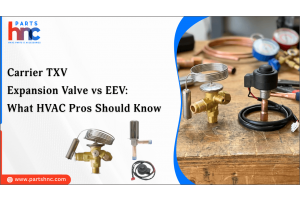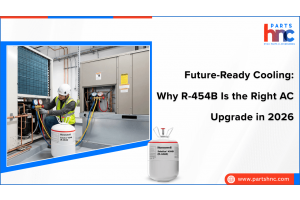How Much Does It Cost to Install a Heat Pump: Step-by-Step Guide
Heat pumps are revolutionary devices that have transformed the way we heat and cool our homes. Offering both heating and cooling capabilities, they stand as beacons of energy efficiency in an increasingly environmentally-conscious world. But, before you embark on the journey of harnessing their benefits, it's crucial to shed light on a critical aspect of heat pump installation cost.
Understanding the financial implications of installing a heat pump is paramount, as it directly impacts your budget and long-term savings. In this article, we will delve into the cost of heat pump installation, enabling you to make an informed decision that aligns with your sustainability goals and financial wellbeing.
Average Heat Pump Installation Cost
When it comes to heat pump cost to install, the cost typically falls within a range of $2,500 to $10,000. On average, homeowners spend around $5,500 for heat pump installation. It's important to note that these costs can significantly increase, sometimes reaching as high as $10,000, especially in cases where a home lacks existing ductwork or when opting for a geothermal or solar-powered heat pump.
|
Heat pump Installation cost Type |
Heat pump Installation cost |
|
Average cost of heat pump installation |
$5,500 |
|
Lowest Cost To install heat pump |
$2,500 |
|
Highest Cost to install heat pump |
$10,000 |
The actual cost of heat pump installation can vary considerably due to several factors, including the specific type of heat pump chosen, the size of your home, the brand of the unit, and the amount of labor required for the installation.
PartsHnC is your one stop solution if you are looking for HVAC parts such as heat pumps, blower wheels, circuit boards, control boards, from top-selling brands. Our inventory includes parts from air conditioners, heat pumps to furnaces, HVAC ventilation parts and controls.
Before we delve into cost to install heat pump system in detail let us look at video:
Heat Pump Installation Cost Breakdown
Heat pump cost to install can significantly impact your home's comfort and energy efficiency. However, the total cost of heat pump installation can vary widely based on several factors. Here is a breakdown of the costs associated with heat pump installation, considering different types, sizes, brands, and labor requirements.
Heat pump system cost by type
Heat pumps are available in various types, each with its own set of advantages and installation costs. The type you choose depends on your specific needs and circumstances. Here are some popular options where you can determine Heat pump system cost by type:
Air-source heat pumps
Air-source heat pumps are cost-effective, especially if you already have ductwork in your home. They extract heat from the outside air to warm your home, even in cooler weather.
Geothermal heat pumps
Geothermal heat pumps are highly efficient but come with a higher upfront installation cost. They utilize heat from the ground or nearby water sources, making them ideal for long-term energy savings.
Solar heat pumps
Solar-powered heat pumps are extremely efficient but require an initial investment in solar panels. Once installed, they can provide sustainable heating and cooling.
Hybrid heat pumps
In colder climates, hybrid heat pumps combine a heat pump with a furnace. The furnace activates when temperatures drop too low for the heat pump to operate efficiently, reducing energy consumption.
Ductless mini-split heat pumps
Homes without ductwork can benefit from ductless mini-split systems. The heat pump cost to install depends on the number of zones (rooms) you need to heat or cool.
Here's a breakdown of unit and heat pump installation costs for different types:
|
Heat Pump Types |
Unit Cost |
Installation Cost |
Total Cost |
|
Air-source |
$2,000 - $5,500 |
$4,000 - $8,000 |
$6,500 - $13,500 |
|
Geothermal |
$3,000 - $6,000 |
$6,000 - $20,000 |
$9,000 - $26,000 |
|
Solar |
$2,000 - $5,000 |
$15,000 - $25,000 |
$17,000 - $30,000 |
|
Hybrid |
$500 - $6,000 |
$2,500 - $10,000 |
$3,000 - $16,000 |
|
Ductless mini-split |
$1,000 - $3,000 |
$1,500 - $8,000 |
$2,500 - $11,000 |
Note: Labor costs in the table above assume your home already has the necessary ductwork, if applicable.
Know about the 9 different types of home heating systems.
Heat Pump System Cost By Size
The size and capacity of your heat pump play a crucial role in its efficiency and cost. Larger homes typically require more powerful and expensive heat pumps. Here's a rough estimate of cost of heat pump installation based on square footage:
|
House Size (in Square Feet) |
Size (in Tons) |
Size (in BTUs) |
|
500 |
1 |
12,000 |
|
1,000 |
2 |
24,000 |
|
1,500 |
3 |
36,000 |
|
2,000 |
4 |
48,000 |
|
2,500 |
5 |
60,000 |
|
3,000 |
6 |
72,000 |
Heat Pump System Cost By Top Brands
The brand of heat pump you choose can also impact the installation cost. Different brands offer varying price ranges. Here are some examples of heat pump cost as per the brands:
|
Brand |
Heat Pump Unit Cost |
|
Amana |
$1,800 - $2,800 |
|
American Standard |
$1,700 - $3,600 |
|
Bosch |
$1,300 - $8,200 |
|
Carrier |
$2,300 - $4,000 |
|
Coleman |
$1,200 - $3,800 |
|
Goodman |
$1,500 - $3,900 |
|
Lennox |
$2,700 - $4,500 |
|
Panasonic |
$1,300 - $2,700 |
|
Rheem/Ruud |
$1,400 - $3,500 |
Labor
Labor costs for heat pump installation can vary significantly depending on the type of heat pump and whether your home already has ducts installed. Geothermal heat pumps and solar-powered systems often require additional labor due to excavation and solar panel installation. Having existing ducts can reduce labor costs for most heat pump types.
Factors That Affect the Cost of Heat Pump Installation
Numerous factors come into play when determining the total expenditure for your heat pump installation. These factors, ranging from the heat pump's efficiency rating to the requisite permits in your area, all contribute to the overall cost of the project. Let's delve into these considerations and explore how they influence the cost of installing a heat pump.
Size and Capacity: The size of your home significantly impacts the cost of your heat pump system. Smaller residences necessitate smaller and more economical heat pumps, whereas larger homes require larger systems.
For instance, a 1,000-square-foot space may suffice with a 2-ton heat pump, which costs between $2,500 to $5,000, while a 2,500-square-foot home would require a 5-ton system, priced between $6,000 to $10,000.
Type: Your choice of heat pump system type can substantially affect your overall expenses. Air-to-air heat pump installations tend to be more budget-friendly, especially if your home already has ductwork in place.
Conversely, geothermal and solar heat pump systems, while cost-effective and efficient in the long term, entail high upfront installation costs.
Efficiency Rating: The efficiency rating of your heat pump plays a vital role in both upfront and long-term costs. HVAC professionals can recommend suitable efficiency ratings based on your home's specific needs and local climate.
There are two key metrics to consider: Heating Seasonal Performance Factor (HSPF) and Seasonal Energy Efficiency Ratio (SEER).
-
High-efficiency heat pumps (with ratings of 19+ SEER and 10+ HSPF) come at a higher initial cost, generally ranging from $7,500 to $10,000 fully installed. However, they offer long-term energy savings, potentially resulting in lower utility bills.
-
Standard or low-efficiency heat pumps with lower SEER and HSPF ratings are more cost-effective upfront, typically priced between $3,500 to $5,000 for full installation.
Permits: Almost every heat pump installation requires permits, with a minimum requirement being a building permit. Additional permits may be necessary if you're excavating land or installing solar panels.
Permit regulations and fees vary by state and city, so it's essential to consult your local government or your HVAC contractor for information on required permits. Some reputable HVAC services may even assist in obtaining these permits on your behalf.
Labor: Labor costs for heat pump installation can vary significantly based on the complexity of the project. You may need to hire various professionals, such as HVAC technicians, solar panel installers, landscapers, and electricians, to complete the job.
Installation costs can range widely, from $1,500 for a ductless mini-split to as much as $25,000 for a solar-powered system.
Duct Installation: If your home lacks existing ductwork, expect higher labor costs for heat pump installation.
Duct installation expenses range from $1,000 to $5,000, contingent on your home's size. Opting for a ductless mini-split heat pump can help you bypass these costs.
Climate: The climate in your region plays a pivotal role in determining the cost and feasibility of a heat pump for your home. In warmer climates, smaller and less powerful heat pump units may suffice, especially in southern regions. Moderate climates can still benefit from heat pumps but may require more potent units. In colder climates, there may be more cost-effective alternatives for heating your home that also offer greater efficiency.
Know about the Cost of a heat pump system.
Heat Pump Pros and Cons
Heat pumps offer both advantages and disadvantages that homeowners should consider before making a decision.
Pros:
-
Energy Efficiency: Heat pumps are highly efficient and can provide both heating and cooling, often using less electricity than traditional HVAC systems.
-
Cost Savings: Lower energy consumption can result in reduced utility bills, making heat pumps cost-effective over time.
-
Environmental Friendliness: Heat pumps produce fewer greenhouse gas emissions compared to fossil fuel-based heating systems, contributing to a greener environment.
-
Versatility: They can work in various climates, providing both heating and cooling capabilities.
Cons:
-
Upfront Cost: Heat pump price to install can be expensive, especially for high-efficiency models.
-
Climate Dependency: In extremely cold climates, heat pumps may struggle to provide sufficient heat, requiring a backup heating source.
-
Maintenance: Regular maintenance is essential to keep the system running efficiently, which can add to ongoing costs.
-
Installation Complexity: Installing a heat pump may require modifications to your home's existing heating or cooling infrastructure, increasing installation complexity and cost.
-
Noise: Some heat pumps can be noisy during operation, which could be a concern for noise-sensitive areas.
Annual Heat Pump Maintenance Costs
To ensure the optimal performance and longevity of your heat pump, investing in annual HVAC maintenance is crucial. A professional inspection with basic maintenance typically costs around $150. This proactive approach helps prevent potential issues.
However, if problems arise, be prepared to budget between $150 and $600 for necessary repairs. For more complex or severe issues, such as heat pump replacement cost for major components or extensive repairs, you may find yourself spending $1,000 or more when hiring a local HVAC repair company. Regular maintenance remains the cost-effective choice to avoid these hefty repair bills.
DIY Heat Pump Installation vs. Hiring a Professional
When it comes to heat pump systems, proper installation is paramount to ensure optimal performance and longevity. The task of installing a heat pump, particularly if it's a geothermal or solar unit, can be quite challenging. In almost all cases, we strongly advise enlisting the services of a qualified HVAC professional to tackle the installation process. Depending on your specific requirements, you may even need to bring in additional experts, such as electricians, excavation specialists, or solar panel installers, to ensure a seamless setup.
Furthermore, it's worth noting that some warranties for new heat pumps may stipulate the necessity of professional installation by a licensed technician. This requirement not only safeguards your investment but also ensures that the system operates efficiently, ultimately saving you money on potential repairs and heat pump replacement cost down the road. So, while the initial installation may involve some costs, it is a wise investment in the long-term reliability and performance of your heat pump.
Step-by-Step Heat Pump Installation Process
Understanding the installation process can help homeowners anticipate each phase and associated costs:
Step 1: Initial Consultation and Assessment
A professional HVAC technician will evaluate your home's size, insulation, and existing ductwork to recommend the appropriate heat pump system.
Step 2: System Selection and Quotation
Based on the assessment, the technician will propose suitable systems, providing a detailed quote that includes equipment, labor, and any necessary modifications.
Step 3: Permitting and Scheduling
Once the quote is approved, necessary permits will be obtained, and the installation will be scheduled at a convenient time.
Step 4: Installation
The installation team will set up the system, which may involve placing the outdoor unit, connecting refrigerant lines, and integrating the system with existing ductwork or setting up ductless handlers.
Step 5: System Testing and Handover
After installation, the system will be tested to ensure proper operation. The technician will provide instructions on system use and maintenance.
How to Save Money on Heat Pump Installation?
Saving money on heat pump installation involves a combination of smart choices and planning. Here are some key strategies:
-
Efficiency Selection: Choose a heat pump with an efficiency rating that suits your needs. While more efficient models can cost more upfront, they often yield lower long-term operating costs.
-
Professional Quotes: Obtain multiple quotes from reputable HVAC professionals. This helps you compare costs and ensures you're getting a competitive price.
-
Energy Efficiency Rebates: Investigate available rebates and incentives from local or federal programs for installing energy-efficient heat pumps. These can significantly reduce your initial investment.
-
Regular Maintenance: Invest in routine maintenance to keep your heat pump running efficiently, reducing the likelihood of costly repairs.
-
DIY Tasks: While professional installation is crucial, there are small DIY tasks like cleaning filters that you can handle to save on maintenance costs.
-
Proper Sizing: Ensure the heat pump is appropriately sized for your space. An oversized unit can lead to inefficiencies and unnecessary expenses.
-
Research Permits: Understand the permit requirements in your area and budget for them to avoid unexpected expenses.
By carefully considering these factors and making informed decisions, you can optimize your heat pump installation costs while enjoying long-term energy savings.
FAQs
How much is a heat pump for a 2000 sq ft house?
The heat pump price for a 2000 sq ft house varies depending on factors like efficiency rating and local permits. It typically ranges from $3,000 to $10,000 or more.
Where should you not put a heat pump?
Avoid placing a heat pump in areas with significant shading, restricted airflow, or near sources of excessive noise to ensure efficient operation and performance. Proper installation is crucial for its effectiveness and longevity.
Do heat pumps use a lot of electricity?
Heat pumps are generally more energy-efficient than traditional heating and cooling systems, but their electricity usage can vary depending on factors such as size, climate, and insulation. Properly sized and maintained heat pumps can be cost-effective and energy-efficient.
Do you need a furnace with a heat pump?
In colder climates, a backup furnace or electric heating element is often recommended to supplement a heat pump's heating capacity during extremely cold weather. However, in milder climates, a heat pump can provide both heating and cooling without the need for a separate furnace.
What is the major problem of heat pumps?
One common issue with heat pumps is reduced efficiency in very cold climates, as they struggle to extract heat from frigid air. Supplemental heating may be required in such conditions. Proper sizing and maintenance are essential to mitigate this problem.
How long does it take for a heat pump to pay for itself?
The payback period for a heat pump typically ranges from 5 to 15 years, depending on factors like energy costs, climate, and the efficiency of the unit. Energy savings over time contribute to recouping the initial investment.
 Loyalty Program
Loyalty Program











